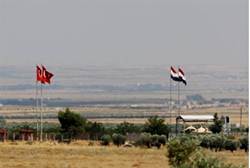Syrian Kurdish militants clashed Tuesday with Al Qaeda-linked rebel terrorist fighters, killing at least four members of the Jabhat al-Nusra (Al Nusra Front) terrorist organization as the Kurds prepared to set the stage for an autonomous region, while Islamists group attempt to establish their own independent “emirates”, ruled by sharia (Islamic law).
Gunfire also spilled over the border with Turkey into the nearby town of Ceylanpinar, killing a 17-year-old Turkish boy and wounding two other people.
The Kurdish People’s Defense Units (YPG) issued a “victory message” late Tuesday, celebrating the ‘liberation’ of Ras al-Ain, in northern Syria, and called on Arabs in the city to cooperate with its group, according to Hawar News. The YPG claimed to hold control over the entire city, as well as the headquarters of the Islamist combatant groups in Ras al-Ain.
The battle took place in the city of Ras al-Ain in the northern province of Hasakeh, according to the UK-based Syrian Observatory for Human Rights, about 62 miles (100 kilometers) from the unofficial Syrian Kurdish capital of Qamishli.
The city is home to some 50,000 people, a mix of Kurds, Arabs, Christians and the Kurdish religious minority Yezidis.
Last January, a Turkish citizen was seriously wounded when a bullet was fired from Ras al-Ain into a Turkish border village. It was the third such incident in a week to occur in fighting between the jihadist rebel forces and Kurdish fighters for control over the city, which have been going on since last year.
The Kurdish National Council, a pro-opposition umbrella group of Syrian Kurdish parties, in January condemned what it said was an ongoing assault “against unarmed civilians” by jihadist insurgents on Ras al-Ain, AFP reported. The Kurds called on the Free Syrian Army to “pressure these militants to stop this criminal war which is detrimental to the Syrian revolution.”
According to a jihad expert quoted by the Al-Monitor website, Middle East Forum Shillman-Ginsburg Fellow Aymenn Jawad al Tamimi, there is a possibility that the Islamic State of Iraq and Syria (ISIS) – the merged group formed from the Iraqi branch of Al Qaeda and Syria’s Jabhat al-Nusra – may be planning to set up Islamic emirates in the areas controlled by its armed terrorist groups.
“In towns such as Jarabulus, where ISIS… has control, ISIS has declared an ‘emirate of Jarabulus,’ for instance,” Tamami wrote in an email to Al-Monitor. “ISIS has an emir of northern operations: Abu Omar…. who leads Jaish al-Muhajireen and was appointed… in May.”
Apparently to counter these moves, the Kurdish militants are reportedly planning to form a transitional Kurdish administration in the areas they control as well.
The YPG is allegedly uniting with Syria’s Kurdish Democratic Union Party (PYD) and the Turkey-based Kurdistan Workers’ Party (PKK), which is listed as a terrorist organization in Turkey and the United States. The groups have formed a plan to hold elections for a local Kurdish government in Syria within six months.
PYD spokesman Alan Semo told the Al-Monitor in a Skype interview, ‘If they are declaring Islamic emirates, why can the Kurds not form their own government? It would be moderate, democratic and non-fanatic, and benefit regional and international interests,” he said.
Tensions in Middle Eastern nations with Kurdish populations – Iran, Iraq, Syria and Turkey – are high due to the conflict in Syria, as well as disputes over oil and gas resources (particularly in Iraq) and the loyalties of the Kurdish population in southeastern Turkey.
Kurds in Iraq, Turkey and Syria dream of an independent state of Kurdistan, although they acknowledge it is unlikely one will emerge anytime in the near future. They are the largest nation in the Middle East without an independent homeland.
Source material can be found at this site.










